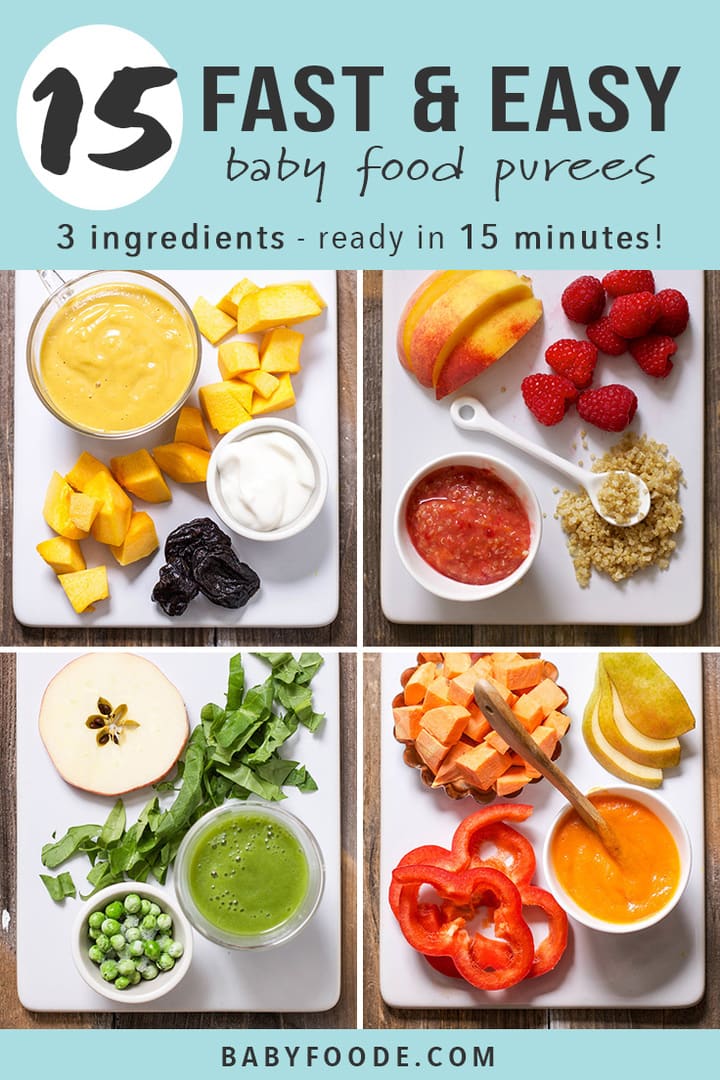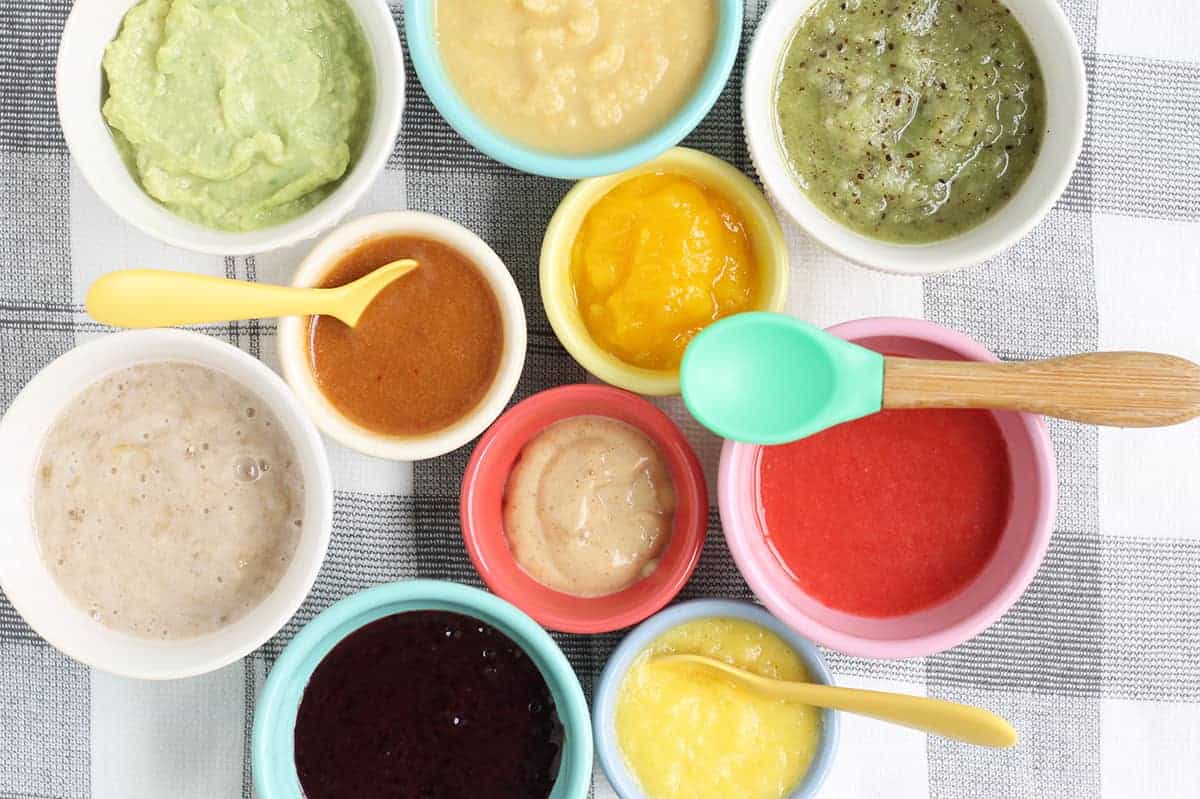As a new parent, it can be overwhelming to decide what to feed your baby. While the convenience of pre-packaged baby food may seem like the easiest solution, it’s important to remember that fresh, homemade baby food is often a healthier and more nutritious option. Plus, making your own baby food can be a fun and rewarding experience for both you and your little one.
In this article, we’ll explore some nutritious baby food ideas that you can easily make at home. From pureed fruits and veggies to protein-packed meals, we’ll cover a range of options to help you provide your baby with the nutrients they need for healthy growth and development. So, let’s get started on this exciting journey of introducing your baby to delicious and nutritious foods!
Introducing solid foods is an exciting milestone for parents and babies alike. Opt for nutrient-dense fruits and vegetables like sweet potatoes, avocado, and blueberries. Mix cooked grains like quinoa, brown rice, or oats with mashed fruits or vegetables for added texture and flavor. Pureed meats, like chicken or turkey, are also great sources of protein. Avoid added sugars, salt, and processed foods. Talk to your pediatrician for more specific guidance on your baby’s dietary needs.


Nutritious Baby Food Ideas: A Guide for New Parents
As a new parent, one of your top priorities is ensuring that your baby gets the best possible nutrition. Feeding your baby the right foods helps to support their growth and development, and sets the foundation for a lifetime of healthy eating habits. In this article, we’ll provide you with some nutritious baby food ideas to help you give your little one the best possible start in life.
1. Breastmilk and Formula
Breastmilk and formula are the best sources of nutrition for your baby in their first year of life. Breastmilk provides all the nutrients your baby needs, and is tailored to your baby’s specific needs. Formula is also a good option if you are unable to breastfeed. It is important to follow the recommended guidelines for formula preparation and storage.
Benefits of Breastmilk:
- Provides all the nutrients your baby needs
- Contains antibodies that help protect against infections
- Reduces the risk of Sudden Infant Death Syndrome (SIDS)
Formula Vs. Breastmilk:
| Formula | Breastmilk |
|---|---|
| Convenient for working mothers | Always available and ready to use |
| May be less expensive | Free |
| Does not contain antibodies | Contains antibodies that help protect against infections |
2. Fruits and Vegetables
Fruits and vegetables are an important part of your baby’s diet, as they provide essential vitamins and minerals. It’s best to introduce them one at a time, and wait a few days before introducing a new food. This will help you identify any potential allergies or sensitivities.
Benefits of Fruits and Vegetables:
- Provide essential vitamins and minerals
- Help to support healthy digestion
- May reduce the risk of chronic diseases later in life
Best Fruits and Vegetables for Babies:
| Fruits | Vegetables |
|---|---|
| Bananas | Sweet potatoes |
| Avocado | Carrots |
| Mango | Peas |
3. Grains and Cereals
Grains and cereals are a good source of energy for your baby. It’s best to choose whole grain options, as they provide more nutrients than refined grains.
Benefits of Grains and Cereals:
- Provide energy for growth and development
- Contain essential nutrients such as iron
- May reduce the risk of chronic diseases later in life
Best Grains and Cereals for Babies:
| Grains | Cereals |
|---|---|
| Brown rice | Oatmeal |
| Quinoa | Barley |
| Whole wheat | Brown rice cereal |
4. Meat and Alternatives
Meat and alternatives are a good source of protein, which is important for your baby’s growth and development. It’s best to choose lean options, and avoid processed meats.
Benefits of Meat and Alternatives:
- Provide protein for growth and development
- Contain essential nutrients such as iron and zinc
- May reduce the risk of chronic diseases later in life
Best Meat and Alternative Options for Babies:
| Meat | Alternatives |
|---|---|
| Chicken | Tofu |
| Turkey | Beans |
| Beef | Lentils |
5. Dairy
Dairy products are a good source of calcium, which is important for bone development. It’s best to choose low-fat options, and avoid added sugars.
Benefits of Dairy:
- Provide calcium for bone development
- Contain essential nutrients such as vitamin D
- May reduce the risk of chronic diseases later in life
Best Dairy Options for Babies:
| Yogurt | Cheese | Milk |
|---|---|---|
| Plain, unsweetened yogurt | Mild cheddar cheese | Breastmilk or formula |
| Greek yogurt | Swiss cheese | Whole milk |
| Low-fat yogurt | Mozzarella cheese | Formula |
6. Homemade Baby Food
Making your own baby food can be a great way to ensure that your baby is getting the best possible nutrition. It can also be more cost effective than buying pre-packaged baby food.
Benefits of Homemade Baby Food:
- You control the ingredients
- You can ensure the food is fresh
- You can introduce a variety of flavors
Best Foods for Homemade Baby Food:
| Fruits | Vegetables | Grains |
|---|---|---|
| Apples | Sweet potatoes | Brown rice |
| Pears | Carrots | Quinoa |
| Bananas | Peas | Whole wheat |
7. Baby-Led Weaning
Baby-led weaning is a method of introducing solid foods to your baby that allows them to feed themselves. It involves offering your baby soft, bite-sized pieces of food that they can pick up and eat on their own.
Benefits of Baby-Led Weaning:
- Encourages self-feeding
- Allows your baby to explore new textures and flavors
- May reduce the risk of obesity later in life
Best Foods for Baby-Led Weaning:
| Fruits | Vegetables | Grains | Meat and Alternatives | Dairy |
|---|---|---|---|---|
| Bananas | Sweet potatoes | Brown rice | Chicken | Plain, unsweetened yogurt |
| Avocado | Peas | Quinoa | Tofu | Breastmilk or formula |
| Mango | Carrots | Whole wheat | Beans |
8. Allergenic Foods
It’s important to introduce allergenic foods to your baby early on, as this may help to reduce the risk of food allergies later in life. The American Academy of Pediatrics recommends introducing these foods between 4 and 6 months of age, after consulting with your pediatrician.
Allergenic Foods to Introduce:
- Peanut butter
- Eggs
- Tree nuts
- Soy
9. Common Feeding Mistakes to Avoid
Feeding your baby can be a challenge, and it’s easy to make mistakes. Here are some common feeding mistakes to avoid:
Feeding Mistakes to Avoid:
- Forcing your baby to eat
- Offering too many sweet or salty foods
- Introducing new foods too quickly
- Not introducing a variety of foods
10. Conclusion
Feeding your baby nutritious foods is essential for their growth and development. Breastmilk and formula are the best sources of nutrition in their first year of life, but it’s important to introduce a variety of foods as they grow. By offering fruits and vegetables, grains and cereals, meat and alternatives, dairy, and homemade baby food, you can help to ensure that your baby gets the best possible nutrition. Remember to introduce allergenic foods early on, and avoid common feeding mistakes. With these tips, you can give your baby the best possible start in life.
Frequently Asked Questions
As a parent, providing your baby with the best nutrition is a top priority. When it comes to baby food, it’s important to ensure that your little one is getting all the essential nutrients for healthy growth and development. Here are some frequently asked questions about nutritious baby food ideas.
Q: What are some nutritious first foods for my baby?
When introducing solid foods to your baby, it’s important to start with simple and easy-to-digest foods. Some great first foods include single-grain infant cereals, pureed fruits and vegetables, and soft cooked meats. These foods are rich in essential vitamins and minerals that your baby needs for healthy development.
It’s also important to introduce one new food at a time, and to observe your baby’s reaction to ensure that there are no allergic reactions or digestive issues.
Q: Can I make my own baby food?
Yes, making your own baby food is a great way to ensure that your baby is getting fresh, wholesome ingredients. You can easily make purees and mashed foods at home using a blender or food processor. Some great ingredients to use include sweet potatoes, peas, carrots, and apples.
When making your own baby food, be sure to wash and peel all fruits and vegetables, and to cook them until they are soft and easy to mash. Avoid adding salt, sugar, or any other seasoning to your baby’s food.
Q: How can I ensure that my baby is getting enough protein?
Protein is an essential nutrient for healthy growth and development in babies. Some great sources of protein for babies include pureed meats, poultry, fish, and tofu. You can also introduce protein-rich grains such as quinoa or millet.
It’s important to introduce protein gradually, and to observe your baby’s reaction. Start with small amounts and gradually increase the portion size as your baby becomes accustomed to the new food.
Q: Can I give my baby dairy products?
Dairy products such as milk, cheese, and yogurt are a great source of calcium and other essential nutrients for babies. However, it’s important to introduce dairy gradually and to observe your baby’s reaction. Some babies may be lactose intolerant or allergic to milk protein.
You can start with small amounts of plain, full-fat yogurt or cheese, and gradually increase the portion size. Avoid giving your baby cow’s milk until they are at least 1 year old.
Q: How can I introduce my baby to new foods?
Introducing your baby to new foods can be a fun and exciting experience. Start by offering small portions of a new food alongside familiar foods. Encourage your baby to explore the new food by touching, smelling, and tasting it.
Be patient and don’t force your baby to eat. It may take several attempts before they accept a new food. Remember to introduce one new food at a time, and to observe your baby’s reaction for any signs of allergy or digestive issues.


BABY FOOD MEAL PREP (9-12 MONTHS) + FREE Downloadable Guide & Recipes
As a professional writer, I understand the importance of providing nutritious and healthy food options for babies. It can be challenging to come up with creative ideas that are not only tasty but also provide essential nutrients for optimal growth and development. However, with a little research and experimentation, there are plenty of options to choose from.
From homemade purees to finger foods, there is no shortage of nutritious baby food ideas. It is crucial to introduce a variety of flavors and textures to help babies develop their taste buds and expand their palate. Additionally, incorporating fruits, vegetables, whole grains, and lean proteins can provide the necessary nutrients for a healthy diet. By providing a variety of options and encouraging healthy eating habits from an early age, we can set our little ones up for a lifetime of healthy eating.



